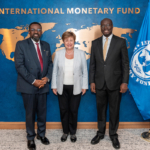
The IMF has revealed that Ghana has made meaningful progress towards laying the foundation for fiscal discipline post-programme completion.
The Washington-based lender maintained that Ghana has been able to put in place key reforms that should last beyond the programme, that is, after May 2026.
Director of Communications at the IMF, Julie Kozack, disclosed this in response to a question posed by Joy Business’s George Wiafe during a press conference in Washington, DC, USA.
The Director of Communications maintained that some of these key initiatives that can be described as lasting reforms include “a revamped fiscal responsibility framework, the establishment of an independent fiscal council, and improvement in public financial management which aims at improving and supporting the efficiency of public spending.”
She also added that “the Fiscal Responsibility Framework includes a primary balance rule that requires an annual primary fiscal surplus of at least 1.5% of GDP, and it also includes a public debt target of 45% of GDP.”
“This fiscal responsibility framework provides some guidance for policymakers as they seek to entrench fiscal discipline in Ghana,” Julie Kozack added.
Government of Ghana on post-IMF programme completion
The government has given the firm assurance that it is taking steps to reassure investors, donors, and the markets that fiscal discipline will be maintained after Ghana exits the International Monetary Fund (IMF) programme in May 2026.
Concerns have been raised that the country could slip back to unsustainable spending once the programme ends.
Government sources told Joy Business that such fears are unfounded, insisting that Ghana’s current performance under the IMF arrangement demonstrates a firm commitment to prudence.
To further strengthen investor confidence, officials say the government is considering subscribing to one of the IMF’s policy instruments, though not a full programme.
This, they argue, would serve as an additional signal of stability and ensure markets remain confident that fiscal discipline will not unravel.
Ghana’s 5th Programme Review
The International Monetary Fund (IMF) on September 29 began its fifth review of Ghana’s performance under the Fund Programme in Accra, Ghana.
The mission team led by Ruben Atoyan is expected to be in Accra for two weeks, engaging the technical staff of the Ministry of Finance and the Bank of Ghana.
They have already met the Governor of the Bank of Ghana, Dr Johnson Asiama, and the Minister of Finance, Dr Ato Forson, as well as the technical team from the Ministry of Finance and the Bank of Ghana.
Sources tell Joy Business that unresolved arrears clearance issues will be a key focus.
However, responding to another question posed by JOY BUSINESS during the press conference on when the mission will complete their engagement in Accra, the director of communications disclosed the team will complete their work on October 10, 2025.
She added that “the team will be assessing the progress that Ghana has made under the IMF programme so far and will communicate their observation after the review”.
If Ghana passes this review, it is expected to receive about $360 million in October 2025. The country has so far received about $2.3 billion since signing the programme.
JOY BUSINESS is also learning that the US$360 million should likely hit the Bank of Ghana’s account before the middle of October.
This review is the penultimate one before Ghana concludes the IMF programme in May 2026.
The final review is scheduled for April 2026.
Analysts describe the current review as crucial, warning that Ghana may struggle to maintain fiscal discipline once the programme ends.
Focus of the 5th Programme Review
Joy Business has gathered that the review will focus on Ghana’s economic data ending June 2025. Key areas of discussion include:
1. Inflation performance.
2. Sustainability of reserve build-up.
3. Audit of arrears.
4. Weak private sector banks requiring recapitalisation.
5. State-owned banks needing recapitalisation, similar to NIB.
6. Fiscal policy shortfalls in the face of an appreciated currency, with adjustments needed to meet the 1.5% of GDP primary surplus target.
7. Arrears build-up in NHIL, GETFund, Road Fund, and other areas.
8. Social spending shortfalls.
Ghana’s IMF Programme and Priorities
On May 17, 2023, the IMF Executive Board approved an SDR 2.242 billion (about US$3 billion) 36-month Extended Credit Facility (ECF) arrangement for Ghana.
This decision allowed for an immediate disbursement equivalent to SDR 451.4 million (about US$600 million), with the rest disbursed in tranches every six months following programme reviews.
The programme seeks to:
- Restore public finances to a sustainable path through revenue mobilisation and improved spending efficiency, while protecting the vulnerable. For example, allocations to the LEAP cash transfer programme and school feeding programme have doubled under recent budgets.
- Support fiscal adjustment and resilience with structural reforms in tax policy, revenue administration, public financial management, energy, and cocoa.
- Curb inflation, with the Bank of Ghana raising interest rates and ending monetary financing of the budget, while maintaining a flexible exchange rate to rebuild reserves.
- Preserve financial stability
- Encourage private investment, growth, and job creation through broader reforms.